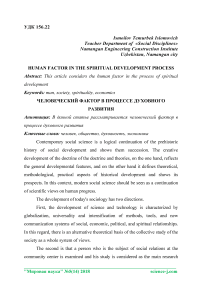Human factor in the spiritual development process
Автор: Ismoilov T.I.
Журнал: Мировая наука @science-j
Рубрика: Основной раздел
Статья в выпуске: 5 (14), 2018 года.
Бесплатный доступ
This article considers the human factor in the process of spiritual development.
Man, society, spirituality, economics
Короткий адрес: https://sciup.org/140289145
IDR: 140289145
Текст научной статьи Human factor in the spiritual development process
Contemporary social science is a logical continuation of the prehistoric history of social development and shows them succession. The creative development of the doctrine of the doctrine and theories, on the one hand, reflects the general developmental features, and on the other hand it defines theoretical, methodological, practical aspects of historical development and shows its prospects. In this context, modern social science should be seen as a continuation of scientific views on human progress.
The development of today's sociology has two directions.
First, the development of science and technology is characterized by globalization, universality and intensification of methods, tools, and new communication systems of social, economic, political, and spiritual relationships. In this regard, there is an alternative theoretical basis of the collective study of the society as a whole system of views.
The second is that a person who is the subject of social relations at the community center is examined and his study is considered as the main research object of sociology. After all, the aforementioned processes have intensified the level of human socialization. The result is that the individual's individualization process, the subject matter of social science subjects, should be clarified.
The main area of research in the field of social sciences is related to the study of the relationships between the needs and interests of different social groups for the organization and management of society on a scientific basis. Increasing controversy between the needs and interests of key elements of society produces conflicts of varying degrees and levels. Studying them in various aspects of society's life is the basis for a specific course of conflict. Disclosure of the causes of conflicts between society, family, labor communities and social groups will be a scientific basis for their elimination and sustainable development.
It is known that the nature of the conflicts is determined by the aggressiveness or aggressiveness of the parties involved. In this context, the science of aggression finds its composition, and it studies the laws of such an event in a comprehensive and consistent way. In the future, this science becomes one of the subjects of independent social science and deals with the complex analysis of social, political, moral and psychological aspects of aggressive behavior. Therefore, at present, the expansion of international terrorism and religious extremism causes the mankind to be afraid of their appearance.
The spread of international terrorism, fundamentalism, and other irreconcilable ideas into the world puts the task of uniting socio-political sciences into one. In his speech at the Fourteenth Session of the Oliy Majlis of the Republic of Uzbekistan, Islam Karimov said: "In today's difficult situation, where international terrorist forces are reintegrating, subversive and abusive, life itself is the international community, including all the countries in our region, to prevent any attacks and terrorist attacks, to overcome their ideological background, and, above all, to convey to the heart and minds of young people, a healthy mind to fight for demands. Therefore, it is necessary to identify them effectively on the scientific basis, based on various research programs.
In the pre-independence period, sociological research was restricted to certain interests, and the tendency to classify them was enforced. In particular, the criteria for social development, from purely party-oriented approaches, its practical outcomes and positive aspects, were linked to the political system of society, dominant ideology.
From this point of view, it is necessary to analyze the ideological components, the features and level of development of our society (geographical, ethnographic, demographic, economic or other socio-political directions) to create a holistic whole system of national ideology in our country.
Creative development of the spiritual and cultural heritage, which is the basis of the idea of national independence, is a complicated process and requires the involvement of two interconnected areas. First of all, it is a component of universal values to preserve the historical heritage and traditions, and the second -to build a spiritual-ideological system that is appropriate for the spiritual development of the society and the realization of their ideas in the practical theoretical change.
Liberalization of the spiritual and cultural life of society is the basis of the development of socio-humanitarian sciences.
Used sources:
-
1. Исмоилов Т. И. ЗАДАЧИ ФОРМИРОВАНИЯ
ИДЕОЛОГИЧЕСКОГО ИММУНИТЕТА В ПРОЦЕССЕ ГЛОБАЛИЗАЦИИ //Теория и практика современной науки. – 2017. – №. 5. – С. 328-330
-
2. Шайдуллаев Н. ОБЕСПЕЧЕНИЕ ИНФОРМАЦИОННОПСИХОЛОГИЧЕСКОЙ БЕЗОПАСНОСТИ В ОТКРЫТЫХ ИНФОРМАЦИОННЫХ СИСТЕМАХ //Теория и практика современной науки. – 2017. – №. 4. – С. 909-912 .
Список литературы Human factor in the spiritual development process
- Исмоилов Т. И. ЗАДАЧИ ФОРМИРОВАНИЯ ИДЕОЛОГИЧЕСКОГО ИММУНИТЕТА В ПРОЦЕССЕ ГЛОБАЛИЗАЦИИ //Теория и практика современной науки. - 2017. - №. 5. - С. 328-330
- Шайдуллаев Н. ОБЕСПЕЧЕНИЕ ИНФОРМАЦИОННО-ПСИХОЛОГИЧЕСКОЙ БЕЗОПАСНОСТИ В ОТКРЫТЫХ ИНФОРМАЦИОННЫХ СИСТЕМАХ //Теория и практика современной науки. - 2017. - №. 4. - С. 909-912.


